When we were in Arles, we took the opportunity to visit this masterpiece of medieval architecture, a little way up in the hills of Provence, about an hour and a half's drive away.
I'd seen similar buildings before, but that doesn't mean it's not still incredible to visit places so charged with the energy of prayer and will, because it's important to mention that construction of the site, which began in 1136, wasn't completed until a century later !
So here we are, heading for a monument that is several hundred years old and designed according to the rules of Cistercian architecture, a design based on the golden number, a sequence that was supposedly divine at the time. Although I'm not a mathematician or very knowledgeable in these fields, I find that this general order is very strongly felt in the place I'm going to present to you.
I don't have the skills to demonstrate this to you, but you can try to feel this sacred geometry and tell me what you think !
Here we are on the road that leads to the abbey. A small road that winds its way through the surrounding mountains and hills.
The earth here is very red. I later learned that there is a lot of bauxite, the ore from which iron is extracted. So there's that characteristic rusty color.
Here we are in the village, at a place called "L'Abbaye".
As soon as you enter the site, you're struck by the peace and quiet that prevails. An important and significant detail is that there is no telephone network on site. When I spoke to someone from the museum, she confirmed that even they used a landline telephone... So the monks had thought of everything ^^.
Before embarking on the visit itself, I wanted to give you a quick rundown on the golden ratio and its counterpart - at least in the West - the Fibonacci sequence. I'd like to make it clear once again that I'm not an expert, so please don't hesitate to add any suggestions or clarifications you may have !
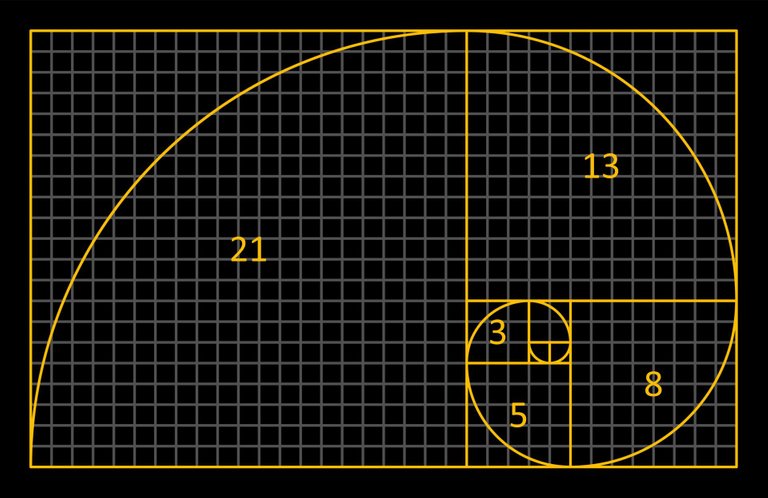
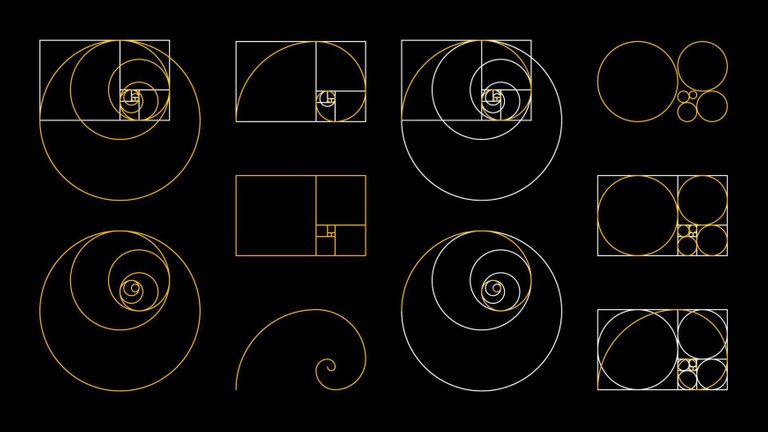
In mathematics, the Fibonacci sequence is a sequence of integers in which each term is the sum of the two preceding terms. Here is the beginning of this sequence:
0 . 1 . 1 . 2 . 3 . 5 . 8 . 13 . 21 . 34 . 55 . 89 . 144 . 233 . 377 . 610 ... and so on !
You'll find here the source of the two images above and here More information on the Fibonacci sequence and its relationship with the golden ratio.
But let's return to our tour of the building and its many outbuildings... and try to make out in the vaults, the proportions and the spaces, the connection with the golden ratio !
These are the vaults of the old entrance that really impressed me ! There's a real sense of grace in these rounded sections, even though they're made of stones weighing several hundred kilos each.
These Romanesque vaults are characteristic of this period of the Middle Ages, which preceded the Gothic style by several centuries.
Here we are again, in front of the church itself. Abandoned after the French Revolution, the site was rediscovered by literary figures from the region, including the author Prosper Mérimée. It was eventually bought by the State and, following its restoration, became a national monument.
I had the opportunity to talk a little with someone who was a guide on site, but unfortunately I wasn't able to take note of everything. In relation to this facade, for example, I remember that the circular window is at a precise angle, forms a perfect triangle and that behind all this there is a divine component.
For example, the staircase leading to the interior of the church has 8 steps, 8 according to her, are the seven days of creation and the eighth is the infinite day, the day that is renewed every morning and is also the day that brings men to death... It's unfortunate that I haven't retained everything, but you'll find plenty of information if you feel like it !
The first image above is the dormitory room, where all the monks of the community slept, watched over in particular by the father abbot, who had a separate cell. We weren't able to go there as it was closed for renovation.
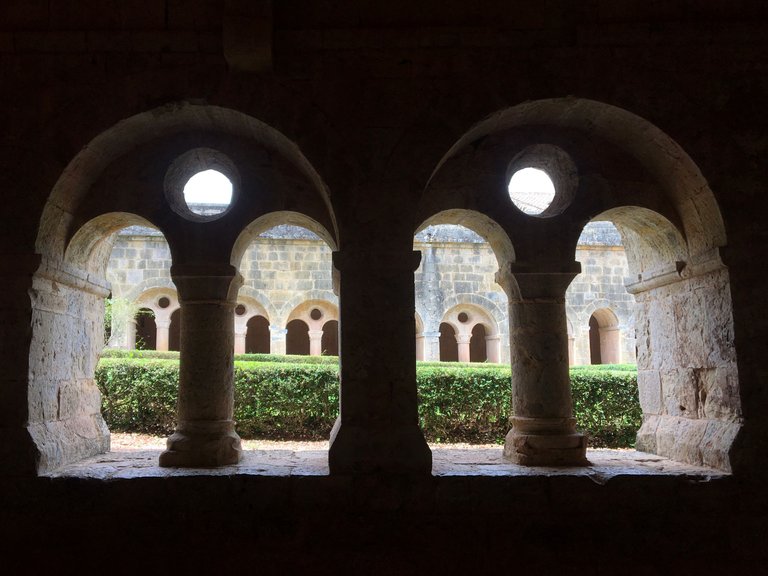
This is the large corridor and the aisles of vaults that run around the inner courtyard of the priory. Once again, the golden ratio is used to determine the intervals, dimensions and proportions of each element. But I'm not an expert, so I just immersed myself in the place... and took a few pictures to share with you !
This is the view from the back of the courtyard. Of course, like all religious buildings, this one is oriented towards the four cardinal points and if I'm not mistaken, this hexagon faces south...
In a small prayer room, there are impressive stone pillars with capitals engraved with symbols and geometric shapes. You will notice that there are very few decorative elements in this place, so those we have just seen are bound to have a deeper significance with the rest of the divine conception of the place and its architecture.
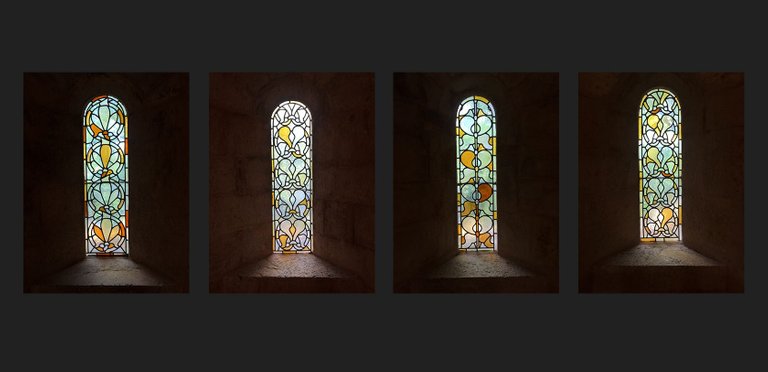
We've also been told that the openings are precisely designed, and this small collection of stained glass windows shows that no two are alike.
Here we are on the other side of the abbey, in a field with a few steps leading around all the buildings. That's where we'll end our visit !
And here we are again, on the road with this ochre-red stone, in the car, no one is talking much and you can feel that we are all immersed in our thoughts, the link is renewed and we feel, at the same time, more anchored and lighter...
I hope you enjoyed your visit to the abbey and, above all, that you found it interesting, and I'd like to thank you for taking the time to join us ! Thank you also in advance for your insights into the golden ratio :)
<3
All these images are mine, thank you for taking this into account.
Lorsque nous étions à Arles, nous en avons profité pour aller visiter ce chef-d'oeuvre de l'architecture du Moyen-Âge, quelque part perdu dans les collines de la Provence à environ 1 heure et demie de route.
J'avais déjà vu de pareils édifices, mais cela n'empêche pas qu'il est toujours incroyable de parcourir des endroits aussi chargés d'énergies de prière et de volonté, car il est important de mentionner que la construction du site, commencée en 1136, ne s'acheva qu'un siècle plus tard !
Nous sommes donc là en direction d'un monument pluri-centenaires et conceptualisé selon les règles de l'architecture cistercienne, une conception suivant le chiffre d'or, une suite alors supposée divine à l'époque. J'ai beau ne pas être mathématicien ni très calé dans ces domaines-là, je trouve que cet ordre général se ressent très fortement dans le lieu que je vais vous présenter.
Je n'ai pas les compétences pour vous démontrer cela, mais vous essayerez de ressentir cette géométrie sacrée et vous me direz ce que vous en avez pensé !
Nous voilà sur la route qui mène à l'abbaye. Une petite route qui serpente dans les montagnes et les collines environnantes.
Ici, la terre est très rouge. J'ai appris par la suite qu'on y trouve beaucoup de bauxite, le minerai dont on extrait le fer. On retrouve donc cette couleur de rouille si caractéristique.
Nous voilà arrivés sur la commune, au lieu-dit de "L'Abbaye".
Dès que l'on pénètre sur les lieux, on est frappé par le calme ambiant et la grande paix qui y règne. Détail important et significatif, on n'a pas de réseau sur place. En ayant parlé avec une personne du musée, elle m'a confirmé que même eux utilisaient un téléphone fixe... Les moines avaient donc pensé à tout ^^
Avant de nous lancer dans la visite en tant que telle, j'ai tenu à vous faire un rapide point sur le nombre d'or et sur son pendant - au moins en Occident - la suite de Fibonacci. Je tiens à préciser de nouveau que je ne suis pas un expert et n'hésitez surtout pas à apporter vos suggestions et précisions d'informations !


En mathématiques, la suite de Fibonacci est une suite d'entiers dans laquelle chaque terme est la somme des deux termes qui le précèdent. Le début de cette suite, le voici :
0 . 1 . 1 . 2 . 3 . 5 . 8 . 13 . 21 . 34 . 55 . 89 . 144 . 233 . 377 . 610... et cetera !
Vous trouverez là la source des deux images ci-dessus et ici : des précisions sur cette suite Fibonacci et son rapport avec le nombre d'or.
Mais reprenons notre visite de l'édifice et de ses nombreuses dépendances... et tentons de percevoir dans les voûtes, les proportions et les espaces, le rapport avec le nombre d'or !
Voilà ces voûtes de l'ancienne entrée et qui m'ont beaucoup marqué ! On ressent une véritable grâce dans ces arrondis qui sont pourtant constitués de pierres de plusieurs centaines de kilos chacune.
Voilà la suite de ces voûtes romanes, caractéristiques de cette période du Moyen-Âge et qui précède le style gothique de quelques siècles.
Nous revoilà devant l'église en tant que telle. Abandonnée après la Révolution Française, le lieu est retrouvé par des personnalités littéraires de la région, dont notamment l'auteur Prosper Mérimée. Il sera finalement racheté par l'État et deviendra donc après sa restauration, un monument national.
J'ai eu l'occasion d'un peu parler avec une personne qui était guide sur place, malheureusement, je n'ai pas pu tout noter. Par rapport à cette facade par exemple, je me souvient que l'angle de la fenêtre circulaire est à un angle précis, forme un triangle parfait et que derrière tout cela, il y a une composante divine.
Par exemple, les escaliers qui nous mène à l'intérieur de l'église ont 8 marches, 8 selon elle, c'est les sept jours de la création et le huitième, c'est le jour infini, celui qui se renouvelle chaque matin et c'est aussi celui qui amène les hommes à la mort... Je vous dit que je n'ai pas tout retenu, c'est malheureux, mais sachez que vous trouverez pleins d'informations si le coeur vous en dit !
La première image ci-dessus, c'est la salle du dortoir, là où tous les moines de la communauté dormaient, surveillés notamment par le père abbé qui avait une cellule à part. Nous n'avons pas pu aller y faire un tour comme celle-ci était fermée pour travaux.

Voilà le grand couloir et les allées de voûtes qui font le tour de la cour intérieure du prieuré. De nouveau, on retrouve le nombre d'or pour tout ce qui concerne les intervalles, les dimensions et proportions de chaque élément. Mais n'étant pas un sachant, je me suis contenté de m'immerger dans le lieu... et de prendre quelques images à partager avec vous !
Voici la vue depuis l'arrière de la cour. Forcément, comme tous les bâtiments religieux, celui-ci est axé par rapport aux quatre points cardinaux et si je ne me trompe pas, cet hexagone est dirigé vers le sud...
Dans une petite salle de prière, on trouve d'impressionnants piliers de pierre avec des chapiteaux gravés de symboles et formes géométriques. Vous remarquerez qu'il y a très peu d'éléments décoratifs dans cet endroit et ceux que nous venons donc de voir ont forcément une signification plus profonde avec le reste de la conception divine du lieu et de son architecture.

Les ouvertures aussi sont étudiées de façon précise nous a-t-on dit et on remarquera aussi dans cette petite collection de vitraux que pas un n'est similaire aux autres.
Nous voilà de l'autre côté de l'abbaye dans un champ avec quelque escaliers qui permet de faire le tour de l'ensemble des bâtiments. C'est là que nous terminerons cette visite !
Et nous voilà de nouveau sur la route avec cette pierre ocre-rouge, dans la voiture, personne ne parle beaucoup et on sent bien que nous sommes tous plongés dans nos pensées, le lien est renouvelé et nous nous sentons, dans le même temps, plus ancrés et légers...
J'espère que cette visite à l'abbaye vous aura plût et surtout intéressée et je vous remercie d'avoir pris le temps de la faire à nos côtés ! Merci aussi par avance pour vos lumières et savoirs concernant le nombre d'or :)
<3
Toutes ces images sont les miennes, merci d'en tenir compte.
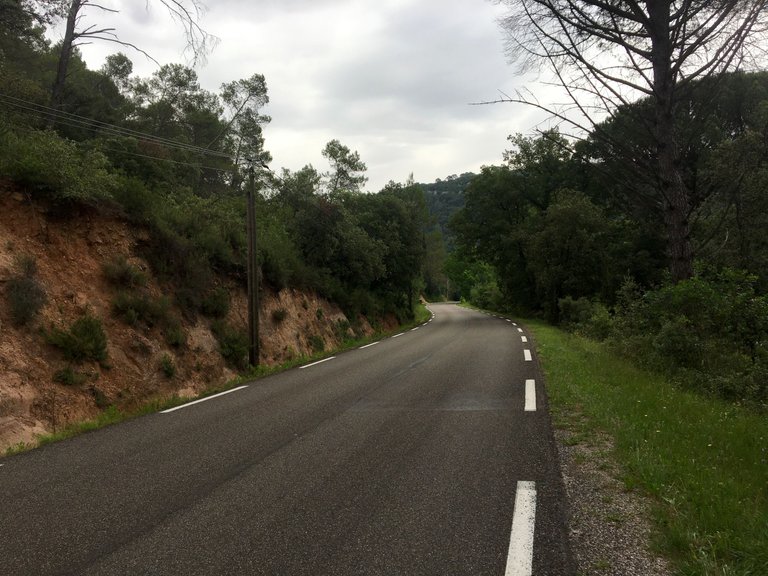
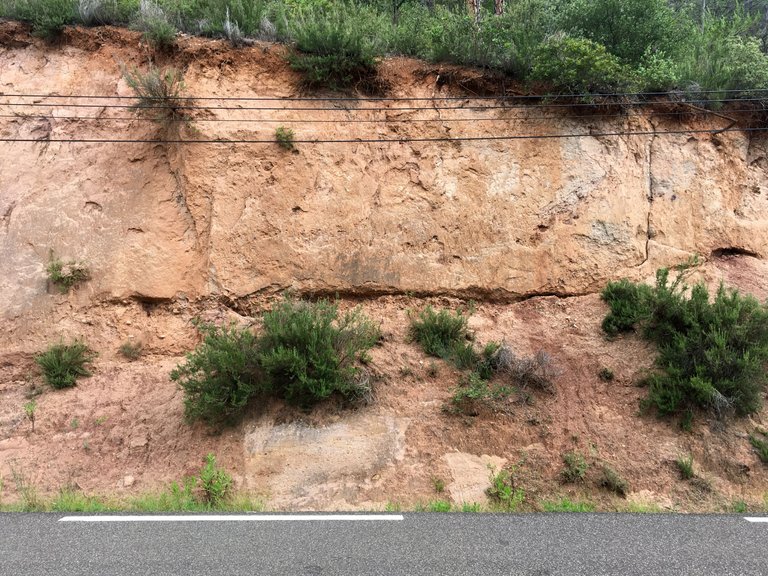
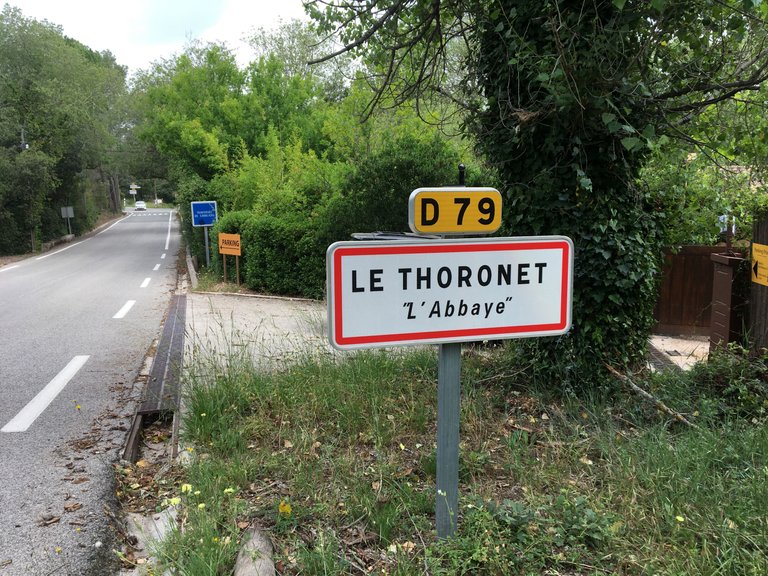
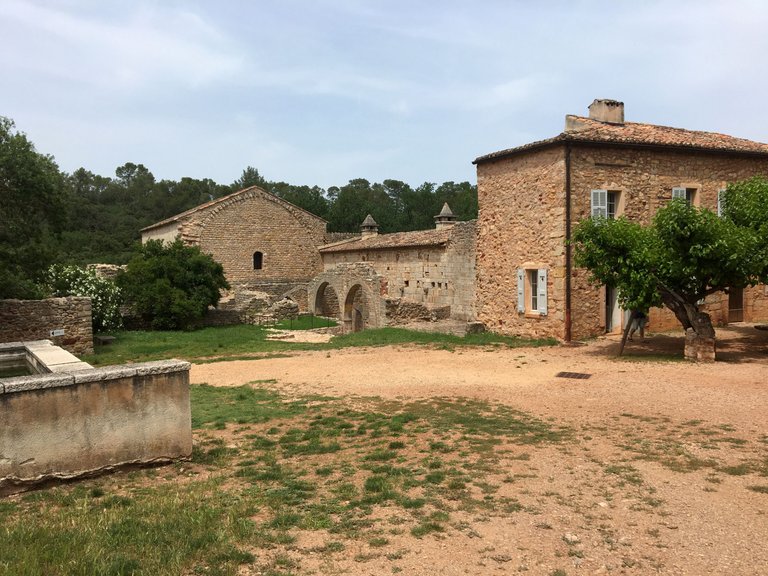
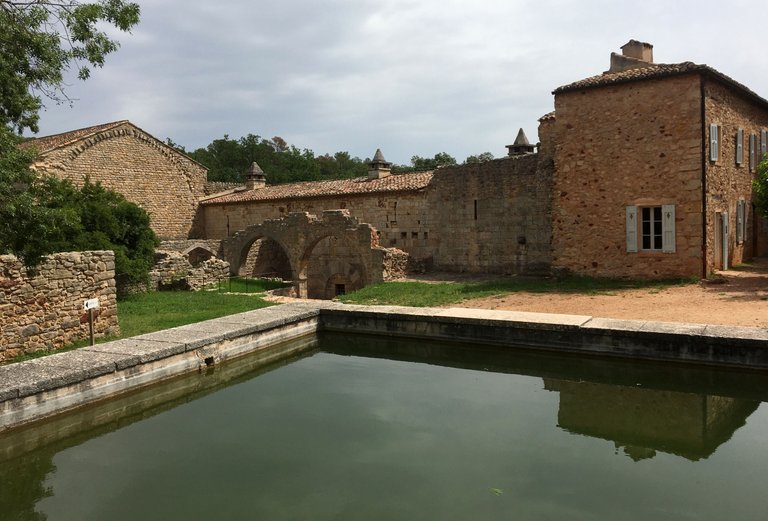
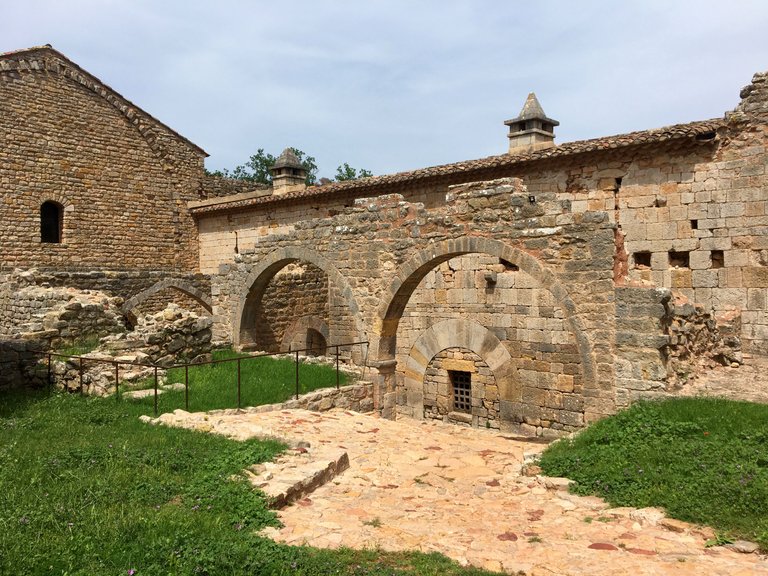
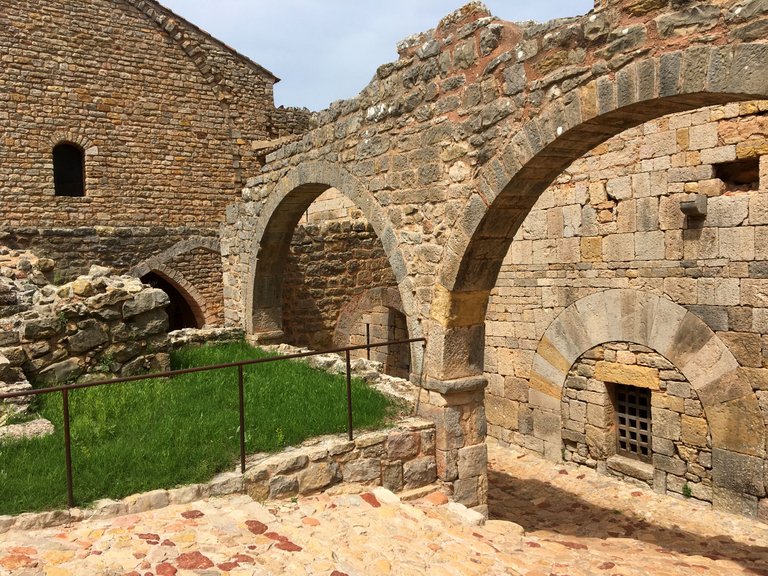
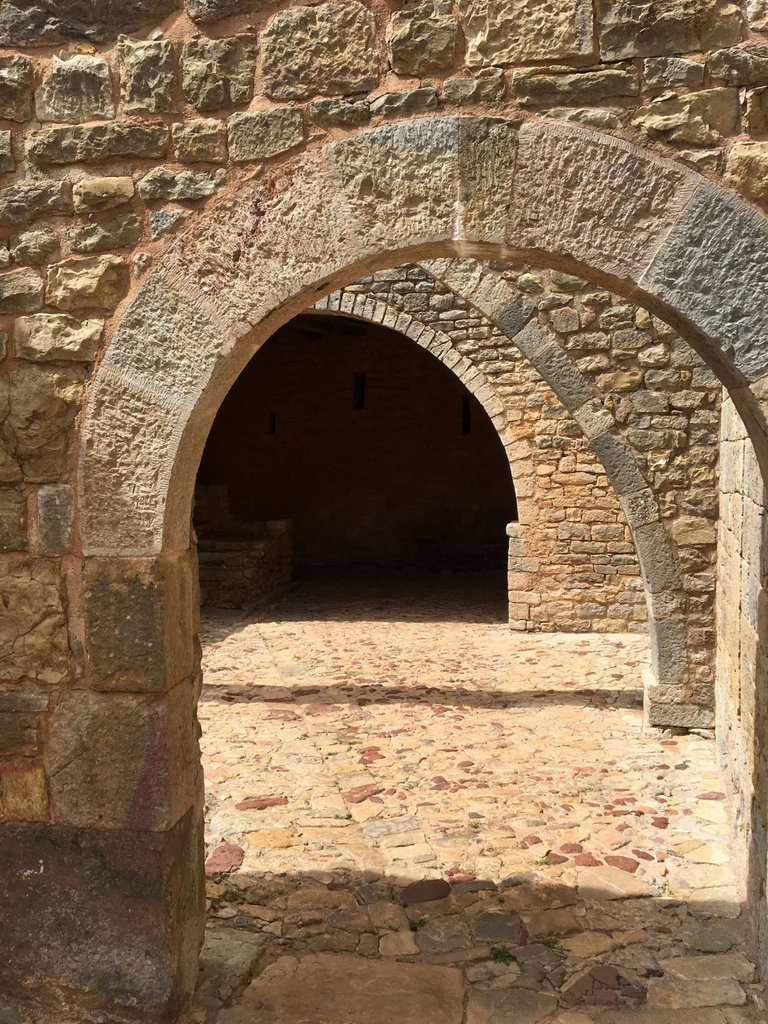
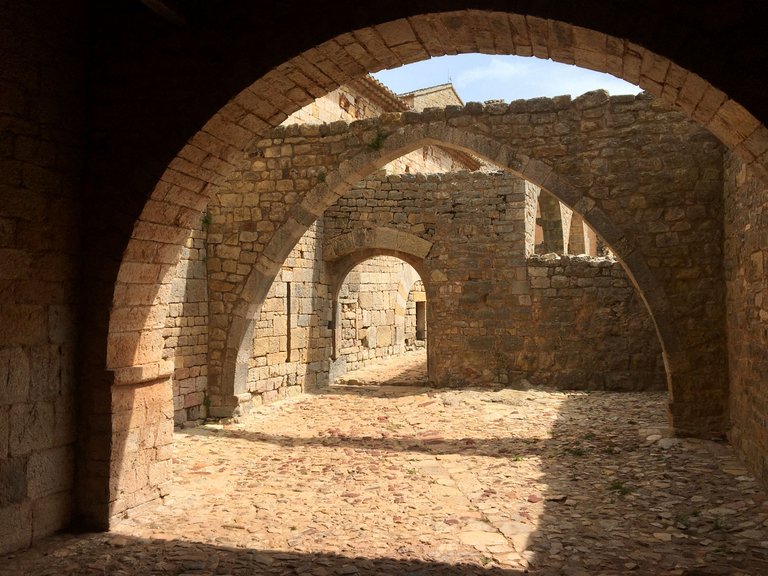
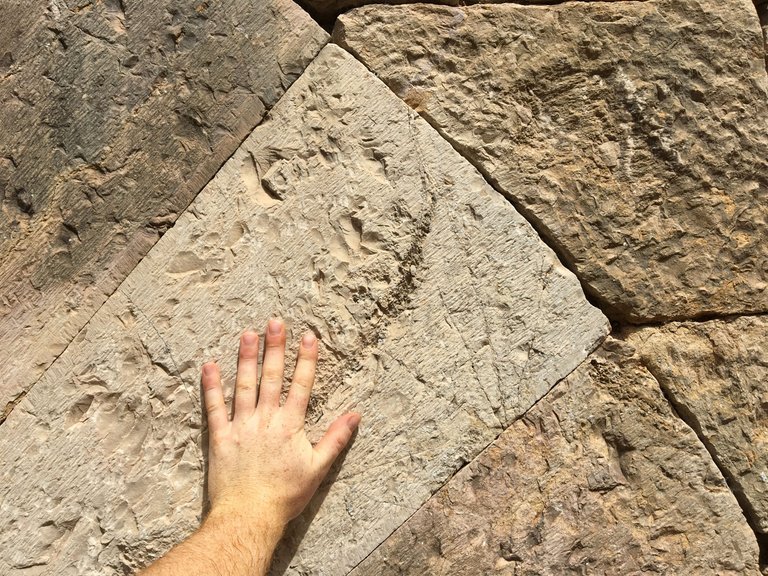
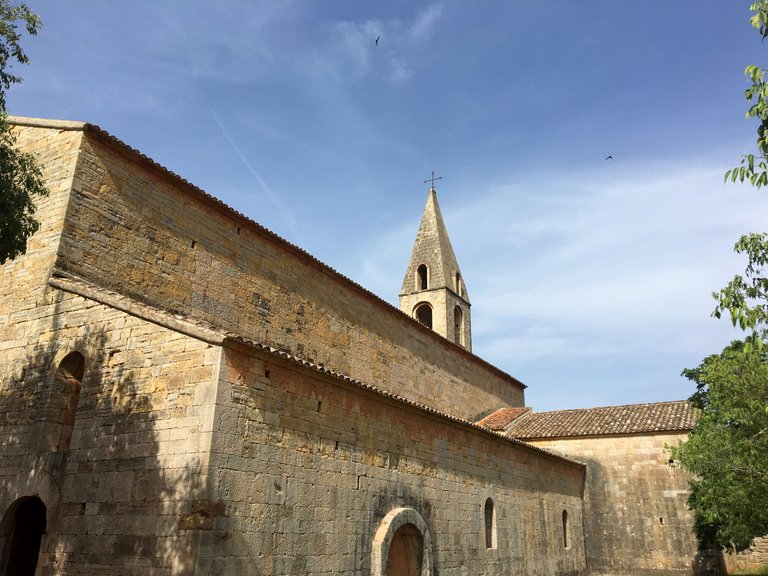
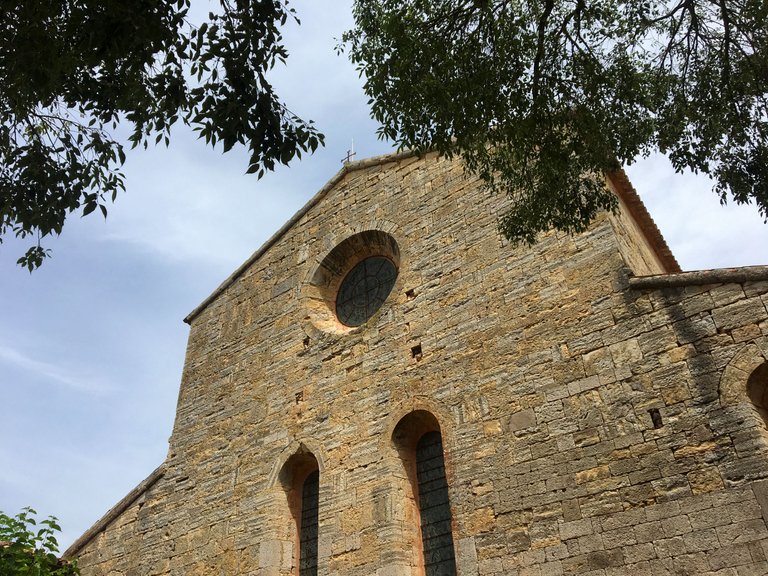
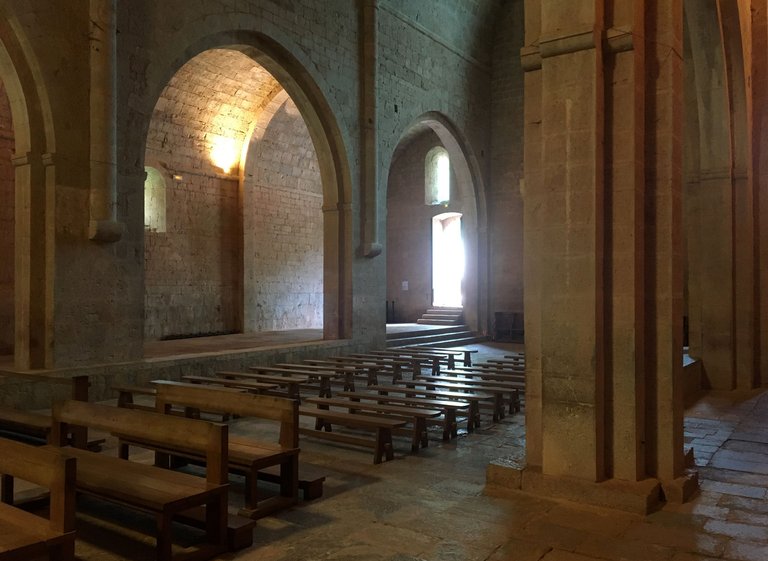
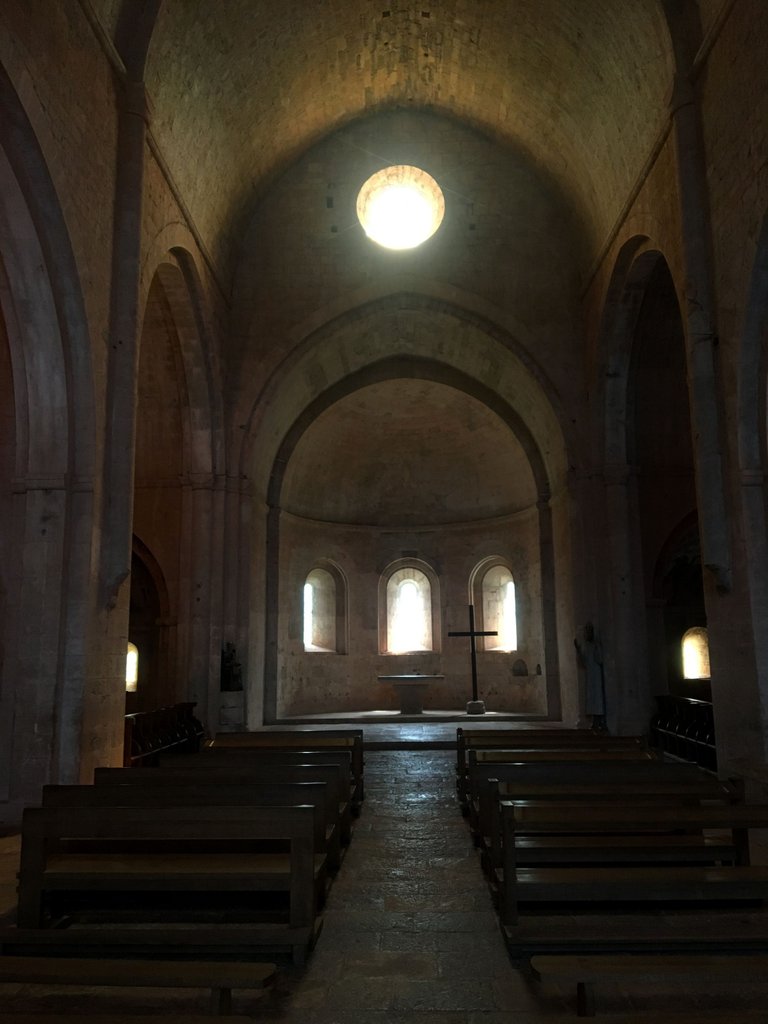
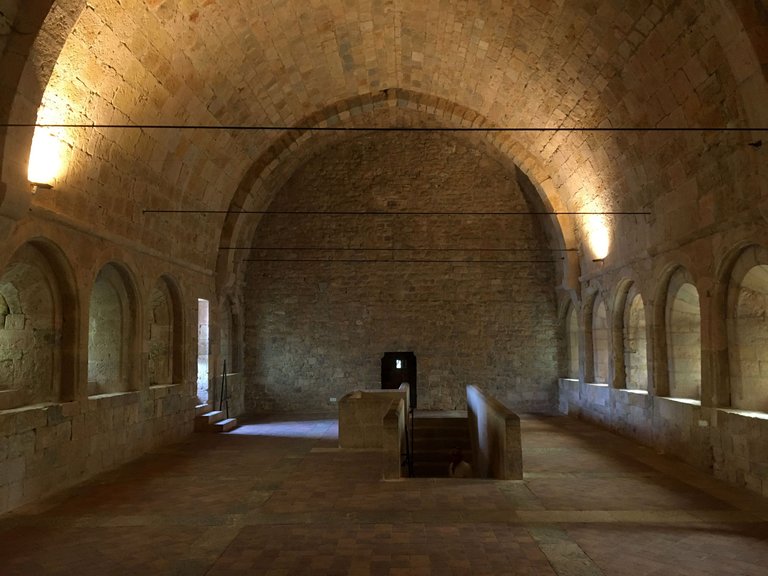
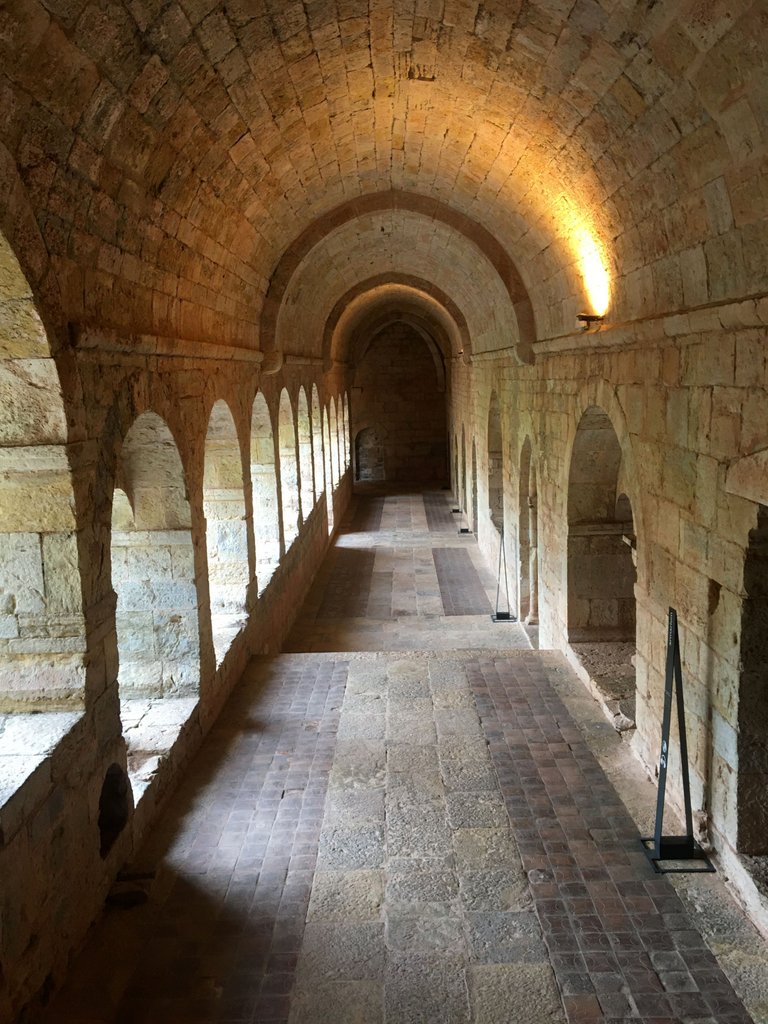
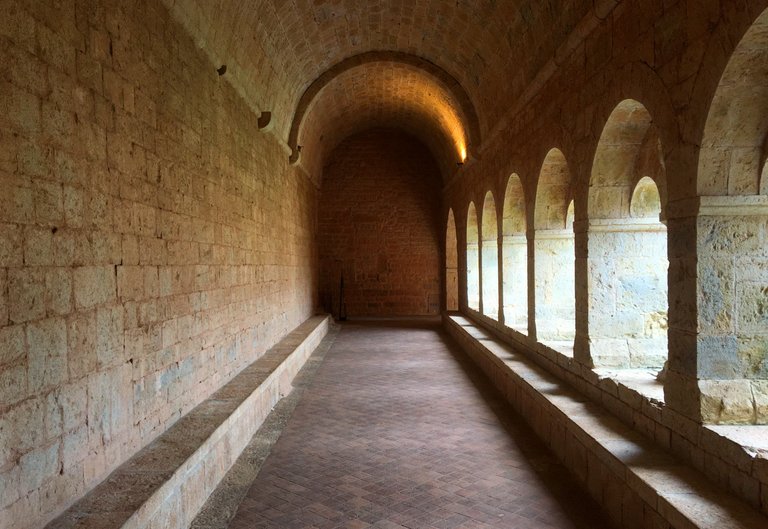
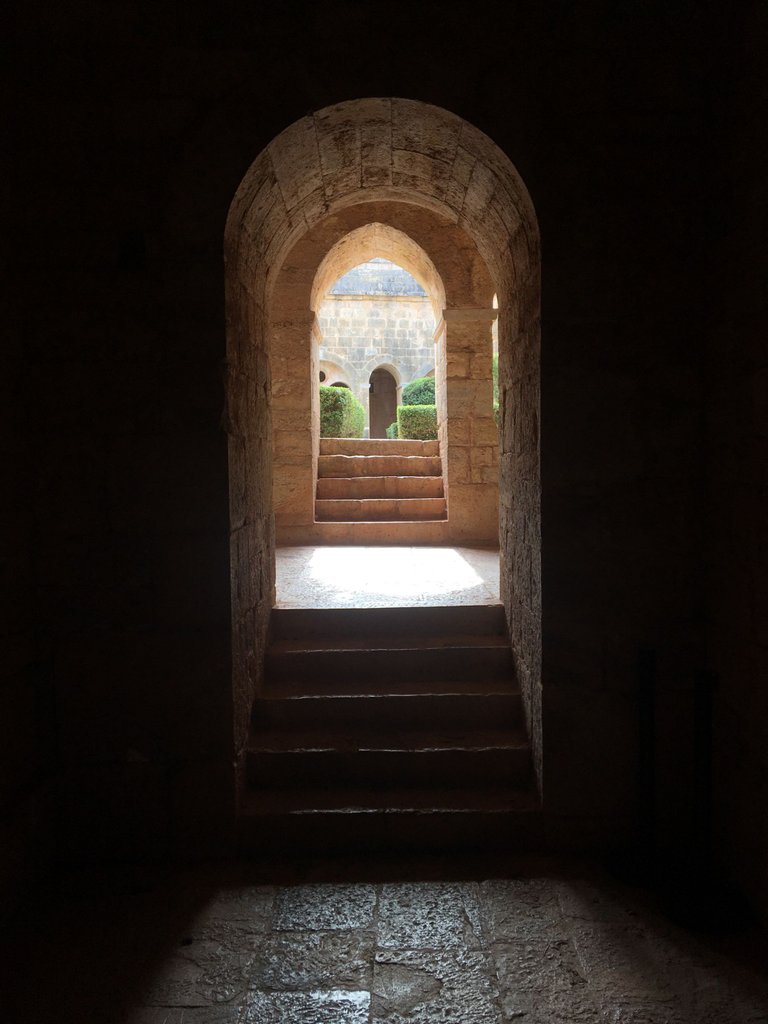
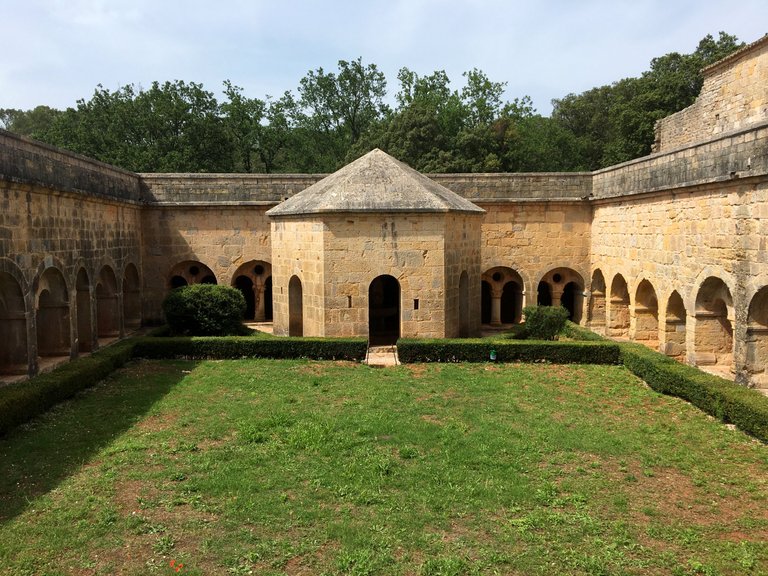
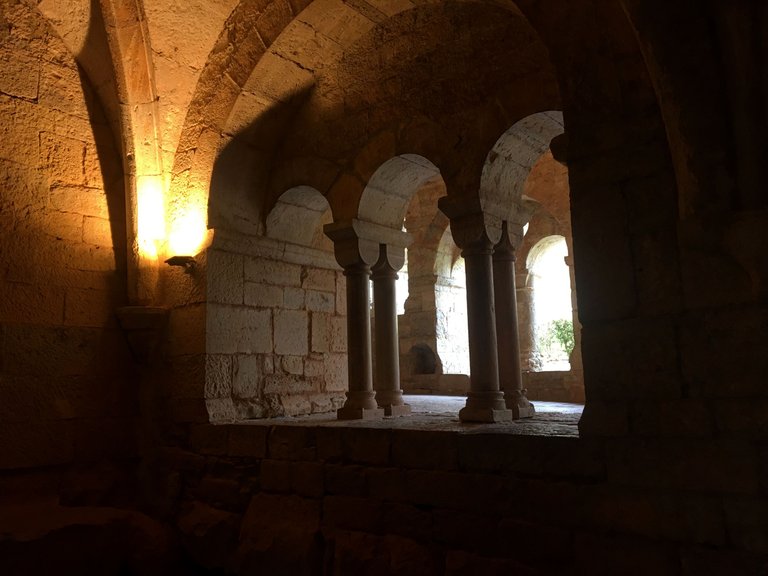
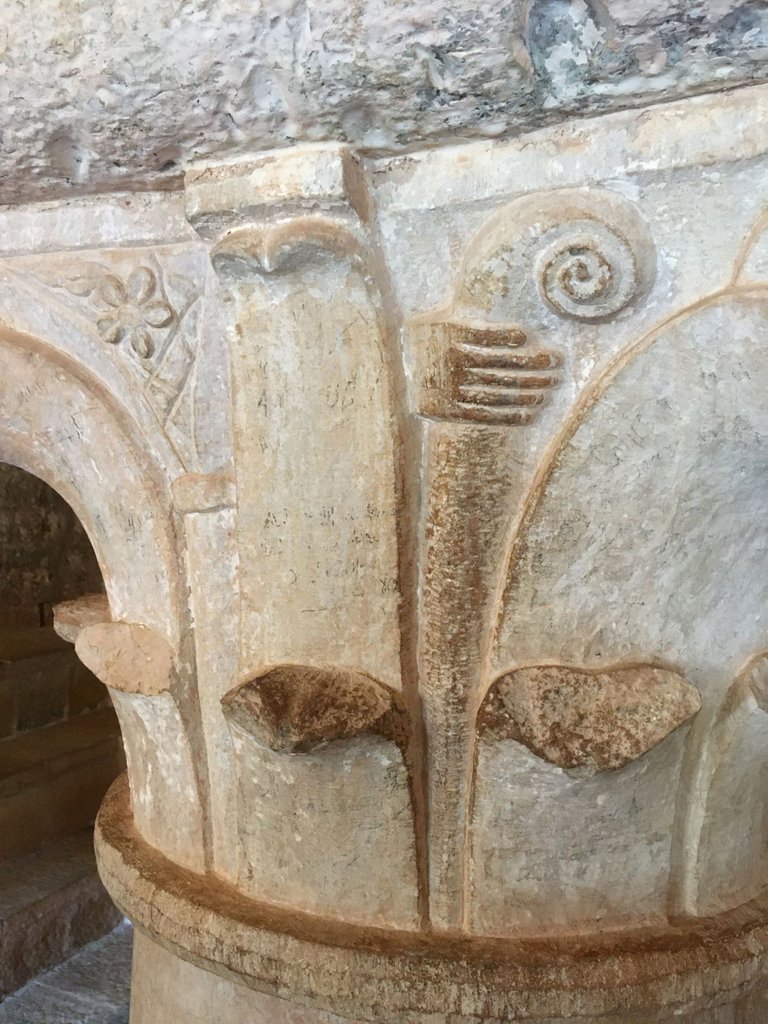
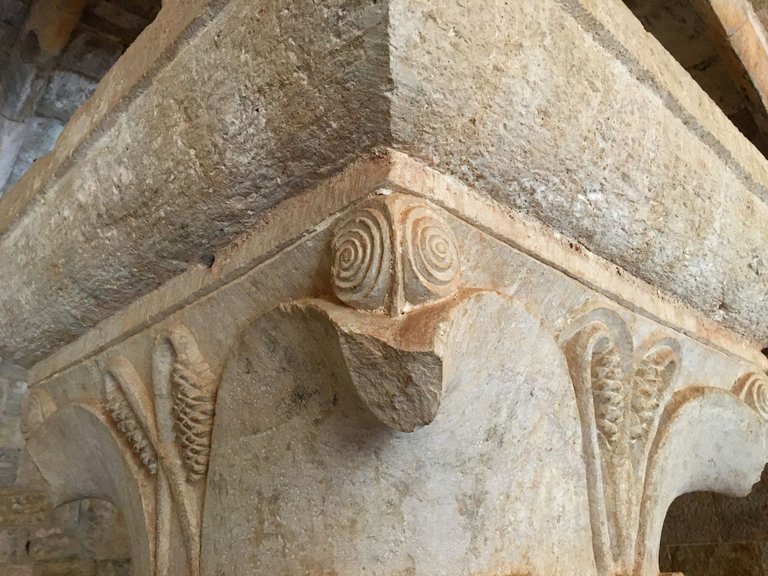
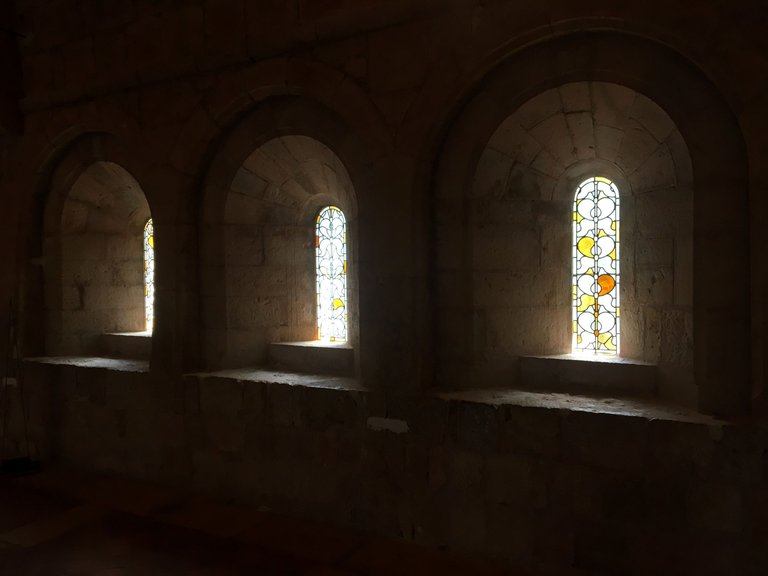
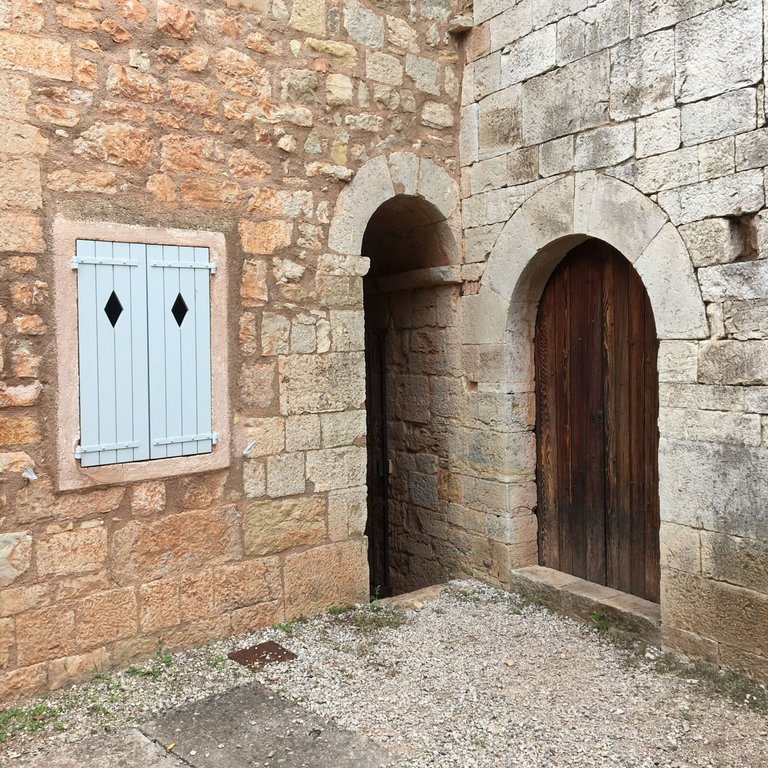
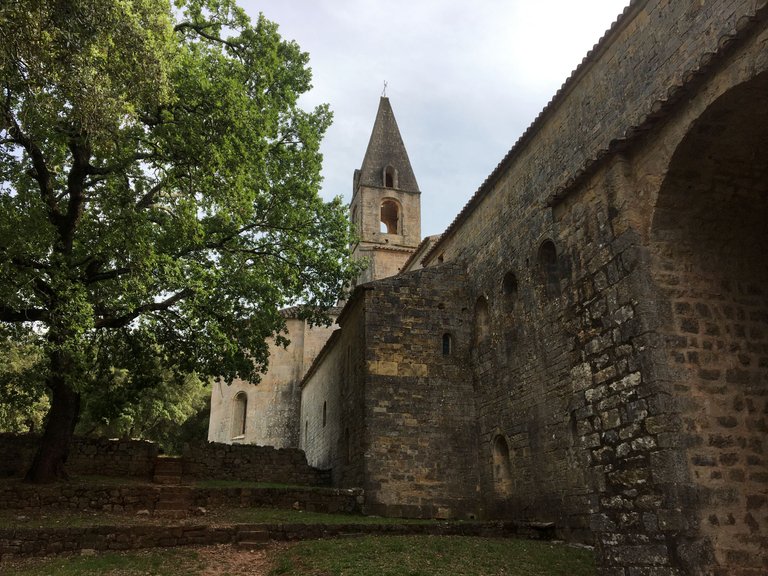
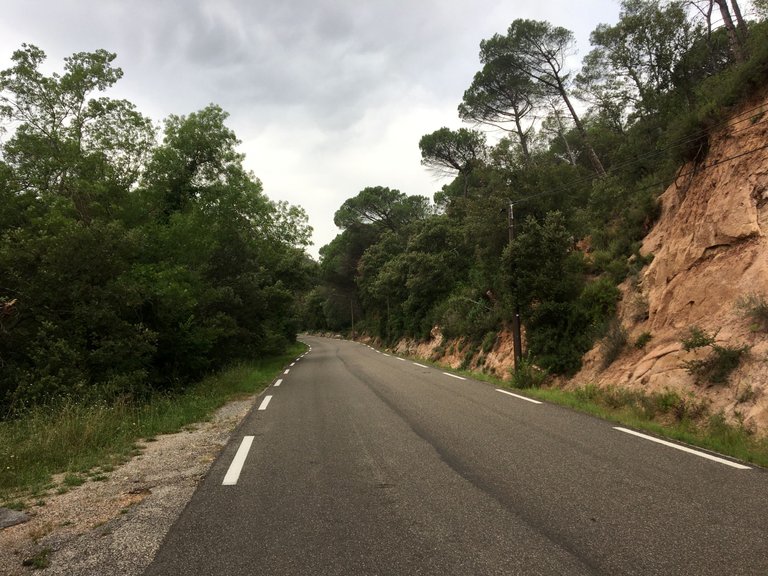
I love visiting places like this 🙂 these old stone buildings carry so much history, and when you walk there it feels like monks were there right at that time too 🙂
Great post! Thank you for sharing and have a lovely day!
You're right, at each corner, I was really imagining the monks just in front of me, praying or preparing food haha... Maybe I'm too much thinking about my next meal to be a real monk ^^ ?
Thank you dear @delishtreats, today is the real moving day, it will start in few hours and I'm already tired 😂
Have a good day ahead 😘
Discord Server.This post has been manually curated by @steemflow from Indiaunited community. Join us on our
Do you know that you can earn a passive income by delegating to @indiaunited. We share more than 100 % of the curation rewards with the delegators in the form of IUC tokens. HP delegators and IUC token holders also get upto 20% additional vote weight.
Here are some handy links for delegations: 100HP, 250HP, 500HP, 1000HP.
100% of the rewards from this comment goes to the curator for their manual curation efforts. Please encourage the curator @steemflow by upvoting this comment and support the community by voting the posts made by @indiaunited.
Wow, what a fascinating place. 🥰 And I'm sure still a place of spiritual power even though it's not used by any moks any longer.
I like these kind of places a lot. It's really stunning what people were able to achieve back in these times with so much less technology. Just by working together instead of everyone being an "single fighter" on their own. It really makes me think a lot of the world and time we live in.
As for the golden ratio: it's a principle with a wide spread. It's also used in photography a lot for example. Sometimes a bit approximated as the rule of thirds. But still based on the golden ratio. Itmakes me smile that the monks back in the time designed their home following this concept of harmony. Tells us a lot about their principle mindset, I guess. 😀
Thanks a lot for taking us with you on this trip. It was a pleasure to pay you company. Even though it was just virtually...
Take care and all the best for the move to your new home!
I completely agree with you on the need for a common front, it's something that still exists, but that has changed a lot, especially in the digital age it seems to me, but it must have been reassuring to know that you could count on your geographical neighbors...!
What's interesting about this type of aesthetic rule is really what you make of it, and what's special about religious buildings is the divine point of view that's put into the thing, in this case this abbey... whereas for some people, it's just a rule of proportion and not a spiritual path above all !
I wish you to have a good and pleasant day !
Daily Travel Digest #1929.
Become part of our travel community:
- Join our Discord
- Learn more about our travel application
Hiya, @LivingUKTaiwan here, just swinging by to let you know that this post made it into our Honorable Mentions in Your post has been manually curated by the @pinmapple team. If you like what we're doing, please drop by to check out all the rest of today's great posts and consider supporting other authors like yourself and us so we can keep the project going!Thank you 😊
Wow - what a place. The stonework and architecture there is fantastic. Totally love the courtyard !
!ALIVE
!LUV
!PGM
This is indeed ! So much quietness, dedication and passion at the same time !
Impressive. You can see from these photos that this place was built with careful planning.
Exactly, those monks were pretty well organized I believe !
Hive-FR
This post was shared and voted inside the discord by the curators team of discovery-it
Join our Community and follow our Curation Trail
Discovery-it is also a Witness, vote for us here
Delegate to us for passive income. Check our 80% fee-back Program
!discovery 40
!ALIVE
!BBH
Your Content Is Awesome so I just sent 1 $BBH(1/5)@anttn! (Bitcoin Backed Hive) to your account on behalf of @dimascastillo90.
Vraiment sympa ta région ...
!PGM
En effet, je n'y étais pas beaucoup allé, mais ça donne envie d'en voir davantage..!
Bonne soirée à toi :)
Congratulations, your post has been added to Pinmapple! 🎉🥳🍍
Did you know you have your own profile map?
And every post has their own map too!
Want to have your post on the map too?